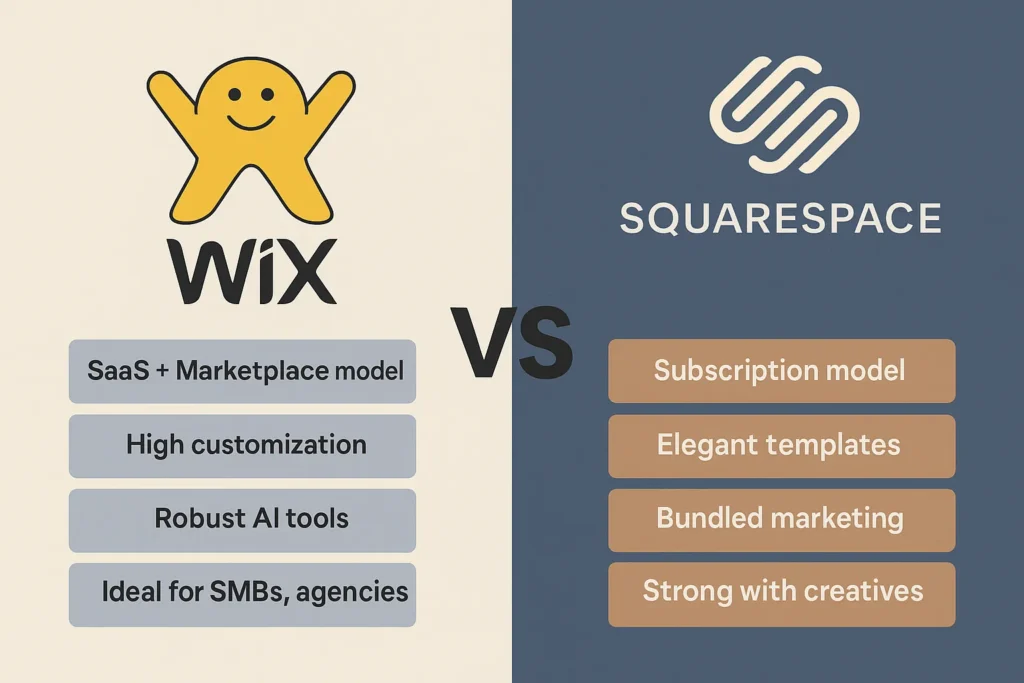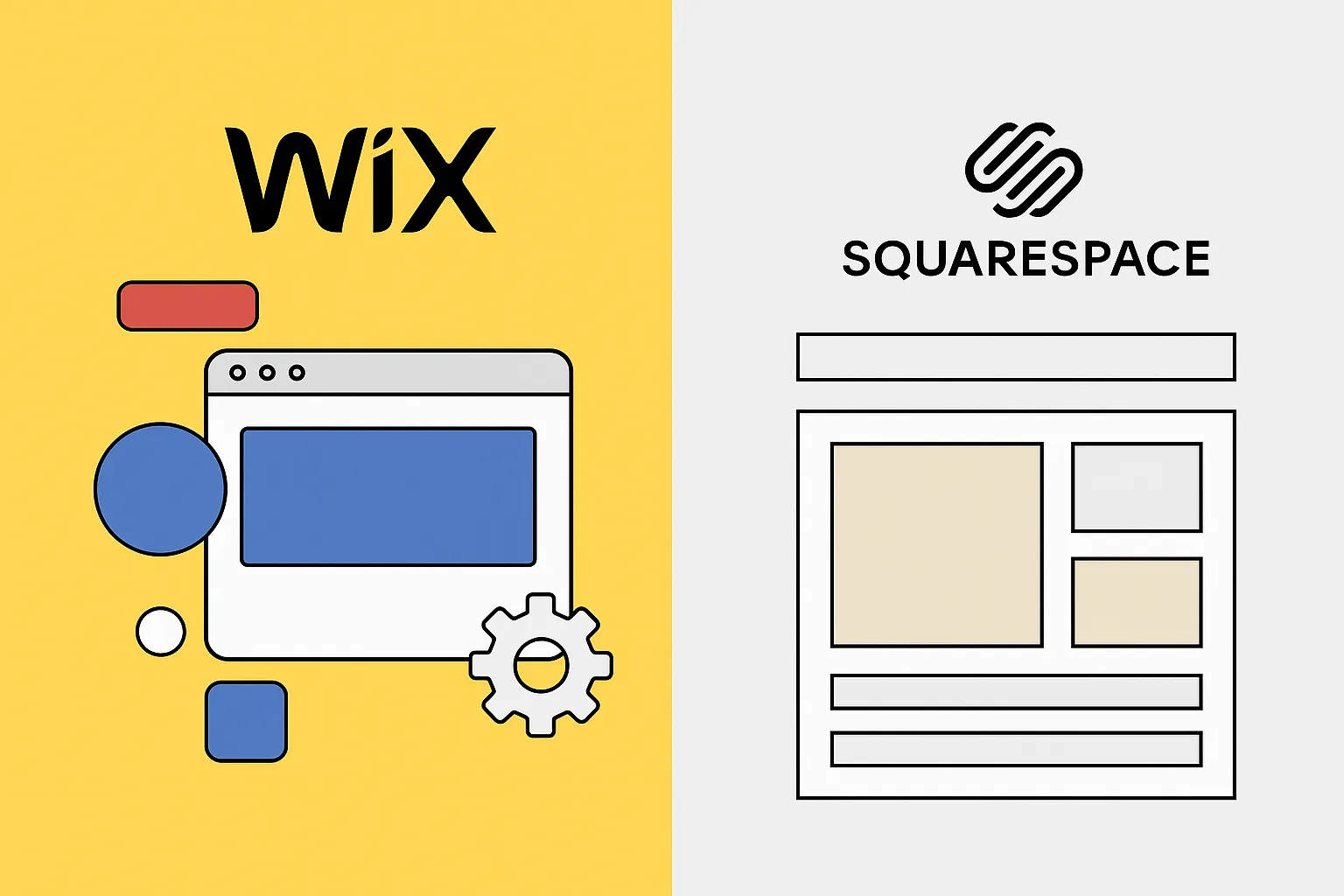In today’s digital-first economy, a brand’s online presence is everything. As more entrepreneurs, creators, and small businesses seek to launch without writing a line of code, website builders like Wix and Squarespace have become indispensable. In 2025, these platforms do more than just offer drag-and-drop interfaces—they provide an entire business ecosystem.
For startup founders and SaaS entrepreneurs aiming to build the next big website builder clone, understanding how Wix and Squarespace generate revenue, manage costs, and scale growth is crucial. Their business models reveal powerful strategies in monetization, partner ecosystems, and user acquisition.
This deep dive into Wix vs Squarespace will help you decide: Which model should you build or clone?

What is Wix?
Wix is a cloud-based website builder launched in 2006 in Israel. Wix provides a no-code solution for building:
- Websites
- Blogs
- Online stores
- Booking systems
- Portfolios
- Membership sites
By 2025, Wix has grown into a robust development platform with tools like:
- Wix ADI (Artificial Design Intelligence)
- Velo by Wix (open dev environment)
- Wix App Market
- Wix Studio for agencies
Wix is used by freelancers, SMBs, and large enterprises to build websites and apps at scale.
What is Squarespace?
Squarespace, founded in 2003, is a sleek, designer-first website and eCommerce builder. Known for its minimalist and visually refined templates, it offers:
- Professional themes
- Integrated blogging & podcasting tools
- Built-in analytics
- Scheduling (via Acuity)
- Email marketing & social integrations
While Wix caters to broader use cases, Squarespace is a go-to for photographers, creators, and boutique stores looking for elegance, branding, and simplicity in an all-in-one platform.
Business Model of Wix
Revenue Streams
- Subscription Plans: Website, Business, and eCommerce tiers
- App Marketplace Revenue Sharing
- Premium Domains & Hosting
- Wix Studio (B2B Agency SaaS)
- Email Marketing Add-ons
- Custom Web Development via Velo
Cost Structure
- Infrastructure (cloud hosting, CDNs)
- R&D for AI tools and site speed
- App developer partner programs
- Global marketing & branding
- Customer success & onboarding
Key Partners
- Google Workspace
- PayPal, Stripe for payments
- Third-party app developers
- Cloud hosting providers
Growth Channels
- AI-powered tools (Wix ADI)
- Marketplace expansion
- Strong SEO & Ads integrations
- White-labeling and reseller programs
Learn More: Business Model of Wix : Revenue Streams and Strategy
Business Model of Squarespace
Revenue Streams
- Tiered Subscription Plans
- eCommerce & Scheduling Add-ons
- Domain Sales
- Email Marketing & Campaigns
- Enterprise Website Design Tools
- Acquired Tools: Acuity, Unfold, Tock
Cost Structure
- Premium cloud storage & hosting
- Product design & UX R&D
- Creator support & customer service
- Partner marketing
- Influencer campaigns & branding
Key Partners
- Stripe, PayPal
- Google Domains, Namecheap
- Acuity Scheduling (in-house)
- App integrations via Zapier
Growth Channels
- Niche creative market targeting
- Brand collaborations & influencers
- Focus on mobile design & commerce
- Integrated design & business tools
Wix vs Squarespace: Comparison Table
| Feature | Wix | Squarespace |
|---|---|---|
| Founded | 2006 | 2003 |
| Revenue Model | SaaS, Marketplace, Add-ons | SaaS, Domains, Scheduling |
| Target Market | SMBs, freelancers, devs, agencies | Creatives, personal brands, SMBs |
| Customization | High (via Velo, APIs) | Medium (template-bound) |
| Template Quality | Extensive, flexible | High-end, elegant, limited |
| AI Integration | Strong (Wix ADI, Smart UX) | Moderate |
| eCommerce Capabilities | Robust & modular | Elegant but less scalable |
| Pricing Flexibility | Multiple tiers + Add-ons | Fewer plans, more bundled |
| App Ecosystem | Large (Wix App Market) | Limited (curated integrations) |
Pros & Cons of Wix’s Business Model
Pros
- Highly scalable platform
- Powerful developer tools (Velo, APIs)
- Strong app marketplace revenue potential
- Advanced AI and eCommerce integrations
Cons
- Can overwhelm beginners
- Slightly bloated UX for non-tech-savvy users
- Marketplace management adds complexity
Pros & Cons of Squarespace’s Business Model
Pros
- Easy-to-use, polished UI
- Strong brand identity in the creative sector
- All-in-one design & scheduling platform
- Built-in marketing tools simplify funnel building
Cons
- Less extensibility than Wix
- Fewer integration partners
- Not ideal for enterprise or large-scale custom builds
Market Data: Growth, Revenue, and Funding
| Metric | Wix | Squarespace |
|---|---|---|
| 2024 Revenue Estimate | ~$1.5 Billion | ~$1 Billion |
| Total Users | 250M+ | 120M+ |
| Paid Subscriptions | ~6M+ | ~4.3M |
| Market Reach | Global, with strong US/Europe base | Primarily US, growing in EU |
| IPO Status | Public (NASDAQ: WIX) | Public (NYSE: SQSP) |
| 2024 YoY Growth | 12–15% | 10–12% |
Which Model is Better for Startups in 2025?
It depends on your business vision:
- Wix’s model is better if you’re building a scalable, modular platform with developer tools, marketplaces, and AI integrations.
- Squarespace’s model is best suited for a polished SaaS that serves niche audiences like creatives, solopreneurs, and service professionals.
Both models are sustainable, profitable, and highly customizable for startup clones, but Wix offers more extensibility, while Squarespace offers better onboarding simplicity.
Choose Wix-style if…
You want to build:
- A multi-tier website builder
- A platform for freelancers, agencies, or SaaS founders
- A solution with AI tools, APIs, and eCommerce
- A clone that supports marketplace monetization
Explore: Wix Clone Development by Miracuves
Choose Squarespace-style if…
You want to build:
- A creative-first platform for designers, coaches, and influencers
- A visual builder with simple pricing and elegant UX
- A niche service marketplace (photographers, stylists, etc.)
- A beautiful and brand-driven clone experience
Explore: Squarespace Clone Development by Miracuves
Conclusion
The decision between Wix vs Squarespace business models comes down to two things: scalability vs simplicity.
- If you want to empower builders, developers, and agencies with flexibility and growth tools — go with the Wix model.
- If your vision focuses on brand-driven, elegant websites for creatives and service-based pros — go with the Squarespace model.
At Miracuves, we help entrepreneurs like you bring these visions to life — from Wix clones to Squarespace-inspired platforms, we build smart, scalable web solutions that launch fast and grow faster.
FAQs
1. What is the main difference between Wix and Squarespace?
Wix is more customizable and developer-friendly, while Squarespace offers polished, template-based experiences for creatives.
2. How does Wix make money?
Through subscriptions, app marketplace revenue share, domains, and value-added services.
3. Is Squarespace easier to use than Wix?
Yes. Squarespace offers simpler templates and fewer customization options, making it beginner-friendly.
4. Can I build a website builder like Wix or Squarespace?
Absolutely. Miracuves offers clone development services tailored for website builder platforms.
5. Which platform is better for eCommerce in 2025?
Wix offers more modular eCommerce options and integrations. Squarespace is best for smaller stores or brand-first shops.








